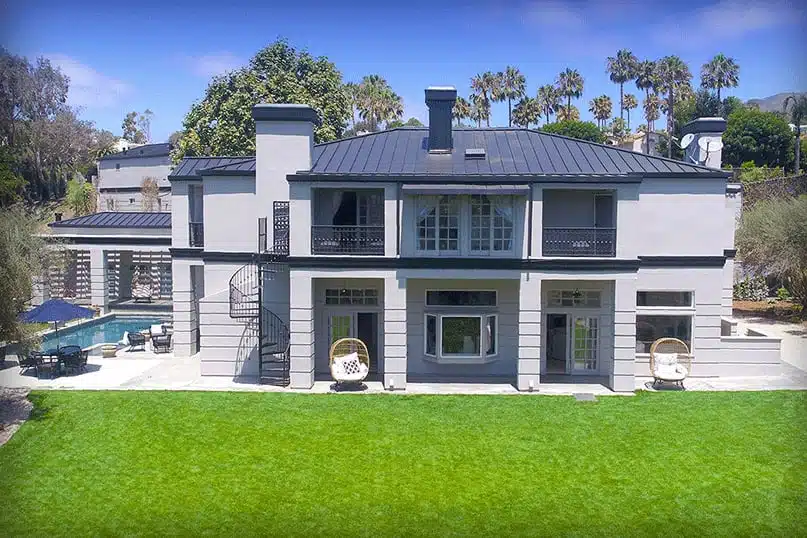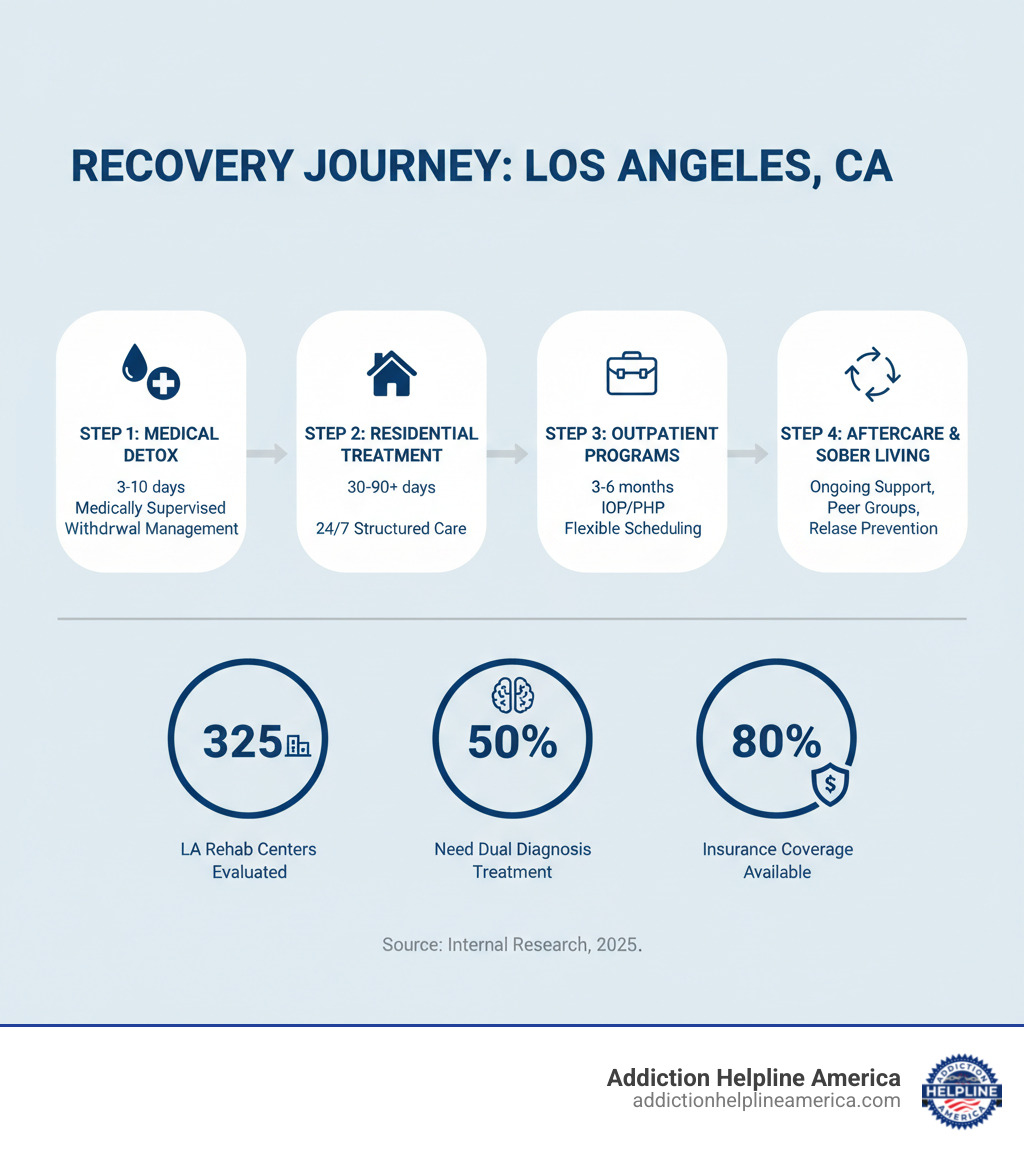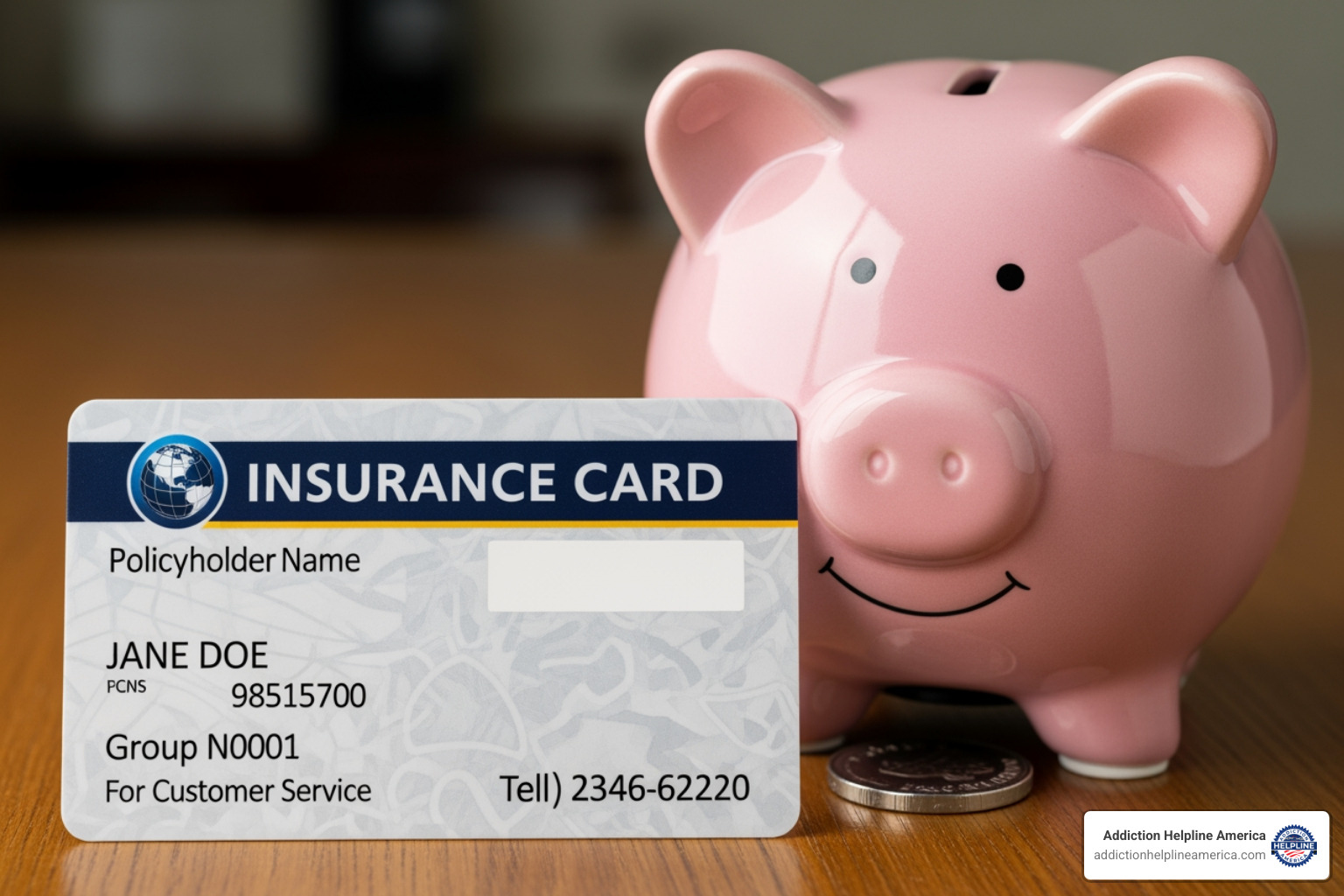
Finding Hope and Healing: Your Guide to Recovery in Los Angeles
Drug & Alcohol Rehabs in Los Angeles, CA provide a comprehensive network of treatment options for individuals and families seeking recovery. With over 300 specialized facilities in Los Angeles County, finding the right path to sobriety starts here.
Quick Overview: What You Need to Know
- Number of facilities: Approximately 325 rehab centers evaluated across Los Angeles
- Treatment types available: Medical detox, inpatient/residential, outpatient (IOP/PHP), sober living
- Insurance accepted: Most private PPO plans (Anthem, Aetna, Cigna, Blue Cross Blue Shield); limited Medicaid/Medicare at private centers
- Cost range: $8,000-$75,000+ depending on program type and duration
- Specialized programs: Dual diagnosis, LGBTQ+, adolescent/teen, executive, luxury, veteran services
- Community resources: L.A. CADA operates 34 facilities with 141 treatment beds and 373 recovery housing beds
Los Angeles is a premier destination for addiction recovery, with treatment ranging from state-funded programs to world-class luxury facilities. Whether facing alcohol addiction, opioid dependence, or co-occurring mental health issues, LA’s providers offer evidence-based therapies like CBT, DBT, and medication-assisted treatment (MAT). The region’s holistic approach combines medical expertise with wellness services and aftercare in Southern California’s healing environment.
The need is urgent, with an estimated 725,000 individuals in Los Angeles County needing addiction care and substance-related deaths rising due to the fentanyl crisis. Yet, hope is abundant as treatment centers across the county save lives daily through compassionate, comprehensive care.
Addiction Helpline America connects individuals and families with life-saving Drug & Alcohol Rehabs in Los Angeles, CA via our 24/7 confidential helpline and verified provider network. Our specialists help you steer insurance, understand treatment options, and find the right program for your unique needs.

Understanding the Addiction Treatment Landscape in Los Angeles

Los Angeles is home to a robust network of addiction treatment facilities. Our research shows over 325 evaluated alcohol and drug rehabs, with 195 actively offering treatment. This extensive network means that no matter your situation, there is a program designed to meet your needs, from publicly funded options to exclusive luxury centers.
The urgency for quality treatment is heightened by the fentanyl crisis, which has caused a surge in related deaths in Los Angeles County, as detailed in this DATA REPORT. FENTANYL OVERDOSES IN LOS ANGELES COUNTY. (2022).. However, the city’s size also fosters a vibrant recovery community, offering strong peer support networks vital for long-term sobriety.
Call Now – Your Journey to Recovery Begins Today!

Take the first step towards a healthier life! Call now to connect with our compassionate team and start your recovery journey today. Your path to healing awaits!
Our recovery specialists are available 24/7 to provide support, and all calls are confidential and free. Reach out anytime – we’re here to help!
The Continuum of Care: From Detox to Aftercare
Recovery is a journey through different levels of care. Los Angeles offers comprehensive options at every stage.
- Medical detoxification is the first step, safely managing withdrawal symptoms under medical supervision for 3 to 10 days. Visit our Los Angeles Detox page to learn more.
- Inpatient or residential programs provide 24/7 care in a structured environment, removing you from daily triggers. Programs typically last 30, 60, or 90 days.
- Partial Hospitalization Programs (PHP) offer intensive daytime care while allowing you to return home or to a sober living facility at night, balancing structure with daily life connection.
- Intensive Outpatient Programs (IOP) provide flexible, structured treatment for several hours, multiple days a week. Ideal for those with work or family commitments, IOPs often last 3 to 6 months. Our California Rehab Outpatient Treatment guide has more details.
- Sober living and aftercare are crucial for long-term success. Sober living homes offer a supportive, substance-free environment, while aftercare includes ongoing therapy and relapse prevention strategies.
Common Therapies and Treatment Models
Quality Drug & Alcohol Rehabs in Los Angeles, CA use a blend of evidence-based and holistic methods.
- Evidence-based therapies like Cognitive Behavioral Therapy (CBT) help change negative thought patterns, while Dialectical Behavior Therapy (DBT) focuses on emotional regulation and mindfulness.
- Dual diagnosis treatment is critical, as about 50% of people with substance use disorders have co-occurring mental health conditions like anxiety or depression. Integrated care addresses both conditions simultaneously for effective recovery.
- Medication-Assisted Treatment (MAT) combines therapy with FDA-approved medications (like Suboxone or Vivitrol) to reduce cravings and withdrawal symptoms, especially for opioid and alcohol dependence.
- Holistic therapies such as yoga, mindfulness, and art therapy complement traditional treatments by addressing overall well-being and helping you find healthy ways to manage stress.
Why Choose Los Angeles for Recovery?
Los Angeles is one of the nation’s premier recovery destinations for several reasons:
- Access to top-tier specialists: The city attracts leading experts in addiction medicine, psychology, and holistic health.
- Diverse treatment philosophies: You can find a program that aligns with your personal beliefs, from 12-step to evidence-based or trauma-informed models.
- Inspiring natural environment: Many rehabs incorporate outdoor activities like hiking and beach meetings, using Southern California’s climate as a backdrop for healing.
- Strong peer support networks: Countless AA and NA meetings are available daily, ensuring you can find a supportive community.
- Anonymity: The privacy and discretion available in a large city can reduce stress during your recovery journey.
Navigating Costs and Insurance for Drug & Alcohol Rehabs in Los Angeles, CA

Understanding the financial side of Drug & Alcohol Rehabs in Los Angeles, CA is a key step. While costs vary, recovery is more accessible than you might think.
The average cost of rehab in California without insurance is around $56,654, but this figure changes based on the level of care. Medical detox can be around $139,673, long-term inpatient rehab averages $49,994, and outpatient treatment is more affordable at about $8,307. Many Los Angeles programs fall on the higher end of these ranges, but options like sliding scale fees and state-funded programs exist to make treatment affordable.
How Insurance Can Cover Treatment
Most private PPO insurance plans are widely accepted by rehabs in Los Angeles. Common providers include Anthem, Blue Cross Blue Shield, Aetna, Cigna, Humana, UnitedHealthcare, Optum, Kaiser Permanente, Molina, and Oscar. Your specific coverage will depend on your plan’s deductible, copays, and out-of-pocket maximum.
Our team at Addiction Helpline America specializes in verifying your benefits for you. We can clarify what your plan covers and estimate your out-of-pocket costs, removing the guesswork. While many private centers accept PPO plans, some have limitations with Medicare and Medicaid coverage. If you have state-funded insurance, excellent options are still available through county programs.
Government and Community Resources for Affordable Care
Los Angeles County provides a strong safety net for those seeking treatment, regardless of ability to pay. The Los Angeles County Department of Public Health’s Substance Abuse Prevention and Control (SAPC) funds and oversees many of these programs. You can Learn about SAPC’s life-changing programs on their website.
One key organization is the Los Angeles Centers for Alcohol & Drug Abuse (L.A. CADA), a nonprofit that operates 34 facilities with treatment and housing beds. They do not turn people away based on financial or insurance status. Explore their offerings at L.A. CADA community services.
Free support groups are also a cornerstone of long-term recovery. These peer-led groups are available throughout LA and are typically free or donation-based:
- Alcoholics Anonymous (AA): Find an Alcoholics Anonymous meeting
- Narcotics Anonymous (NA): Find a Narcotics Anonymous meeting
- SMART Recovery: An alternative to 12-step programs.
- Al-Anon and Nar-Anon: For families and loved ones.
- Other groups include Marijuana Anonymous, Dual Recovery Anonymous, and Crystal Meth Anonymous.
The bottom line is that pathways to recovery exist in Los Angeles, whether you have premium insurance, Medicaid, or no coverage at all.
Specialized and Luxury Treatment Options in LA
Los Angeles is distinguished by its variety of specialized care options, from private, retreat-like experiences to programs designed for unique circumstances.

For those valuing privacy and comfort, luxury Drug & Alcohol Rehabs in Los Angeles, CA provide serene, upscale sanctuaries for healing. These centers believe that when you are comfortable, you can focus entirely on the challenging work of recovery. Amenities often include gourmet meals, private rooms, fitness centers, and spa services. High staff-to-client ratios ensure individualized attention, and executive programs allow professionals to maintain critical work connections securely.
Call Now – Your Journey to Recovery Begins Today!

Take the first step towards a healthier life! Call now to connect with our compassionate team and start your recovery journey today. Your path to healing awaits!
Our recovery specialists are available 24/7 to provide support, and all calls are confidential and free. Reach out anytime – we’re here to help!
What Defines a Luxury Rehab Experience?
A luxury rehab experience is defined by personalized care that addresses your total well-being.
- Personalized, one-on-one care: Treatment plans are highly individualized, with frequent one-on-one therapy sessions with credentialed specialists.
- Integrated wellness services: These centers combine evidence-based therapies with holistic support, such as nutrition counseling, mindfulness, acupuncture, massage, and art therapy.
- Exclusive and serene environments: Many facilities are located on private estates in Malibu or the Hollywood Hills, offering tranquility and resort-style amenities that reduce stress and remove you from daily triggers.
- Focus on comfort to support recovery: The philosophy is that creating an optimal, comfortable environment allows you to dedicate yourself fully to making lasting changes.
Finding Programs for Specific Populations
Los Angeles excels in serving populations with specialized needs, understanding that recovery is not one-size-fits-all.
- Adolescent and teen rehabs: Programs like Paradigm Treatment and Newport Academy offer age-appropriate environments that integrate academic support with therapies effective for young people.
- LGBTQ+ affirming care: Centers such as La Fuente Hollywood Treatment Center provide safe, non-judgmental spaces where staff are trained in cultural competency to address unique stressors like discrimination and trauma.
- Gender-specific programs: These programs for men or women address gender-specific trauma, societal pressures, and relationship dynamics in a comfortable, single-gender setting. For an example of this care in California, see the Women’s Recovery Association The Elms San Mateo, CA.
- Professionals and executives: These programs offer discretion, privacy, and the flexibility for clients to maintain necessary work contact while receiving comprehensive care.
- Veterans: The Downtown LA VA Clinic and other VA Healthcare Systems provide support that addresses both substance use and co-occurring mental health challenges like PTSD, with an understanding of military culture.
How to Find the Right Rehab and Start Your Recovery Journey
Taking the first step toward recovery is a courageous act. If you’re reading this, you’ve already begun the journey by seeking information.

Addiction is a chronic condition characterized by compulsive substance use despite harmful consequences. Recognizing the signs—such as an inability to control use or neglecting responsibilities—is the first step. Before choosing a path, a professional assessment is crucial. A thorough evaluation helps determine the severity of the substance use disorder, identifies any co-occurring mental health issues, and guides you to the appropriate level of care.
Reaching out for help is an act of strength. You are not alone, and help is readily available throughout Los Angeles.
Steps to Finding the Best Drug & Alcohol Rehabs in Los Angeles, CA
Finding the right treatment center requires careful consideration. Here are key steps to guide your search:
- Verify facility accreditation. Look for accreditation from the Joint Commission (JCAHO) or CARF. This signifies that a facility meets rigorous national standards for quality and safety.
- Check state licensing. All legitimate California rehabs must be licensed by the State Department of Health Care Services. You can Check state licensing status online. This protects you from unlicensed operations.
- Inquire about staff credentials. Ask about the qualifications of the medical director, therapists (LMFT, LCSW), and clinical team. A quality center will be transparent about its staff’s experience.
- Understand the treatment philosophy. Does the center use evidence-based therapies like CBT, holistic approaches, or a 12-step model? Find a philosophy that aligns with your values. Our Addiction Treatment Center Southern California Guide offers more insight.
- Consider specialized care. If you need dual diagnosis treatment, or are a teen, LGBTQ+, or a professional, look for programs that specialize in these areas for more targeted support.
What to Expect During the Admissions Process
The admissions process is designed to be as smooth as possible. Here’s what it typically involves:
- Confidential Initial Consultation: A no-pressure phone call with an admissions coordinator to discuss your situation, ask questions, and see if the program is a good fit.
- Comprehensive Intake Assessment: An in-depth evaluation with a clinical professional to review your substance use, medical, and mental health history. This information is used to create your personalized treatment plan.
- Insurance and Payment Verification: The admissions team will work with your insurance provider to verify benefits and explain any out-of-pocket costs. They can also discuss other payment options.
- Travel and Logistical Coordination: Many facilities assist with travel arrangements and provide a packing list to help you prepare for your stay.
- Preparing for Your Stay: You’ll learn about the facility’s rules, daily schedules, and visiting policies to help set you up for success from day one.
At Addiction Helpline America, we’re here to guide you through every step of this process. Our free, confidential helpline connects you with treatment options that match your needs, insurance, and personal circumstances.
Frequently Asked Questions about Los Angeles Rehabs
It’s natural to have questions when considering treatment. Here are answers to some of the most common ones about Drug & Alcohol Rehabs in Los Angeles, CA.
How long does rehab in Los Angeles typically last?
Treatment length is customized to your unique needs, depending on the substance used, addiction severity, and co-occurring conditions. However, there are typical timeframes:
- Medical detox usually lasts 3 to 10 days to safely manage withdrawal.
- Residential or inpatient programs typically run 30 to 90 days, with longer stays available for more complex cases. Research shows longer treatment often leads to better outcomes.
- Outpatient programs (IOP) provide flexible support for 3 to 6 months, while standard outpatient care can continue for a year or more as part of an aftercare plan.
Are there laws in California that support seeking treatment?
Yes, California has laws that protect individuals seeking help. The California Good Samaritan Law provides limited legal protection from drug possession charges for both the person overdosing and the person who calls 911 for help. Additionally, state law requires employers with 25 or more employees to accommodate workers who voluntarily seek addiction treatment, protecting your job while you get the care you need. These laws treat addiction as a medical condition, not a moral failing.
What is dual diagnosis and why is it important?
Dual diagnosis refers to having both a substance use disorder and a co-occurring mental health condition, such as depression, anxiety, or PTSD. This is very common, affecting approximately 50% of people with substance use disorders.
It’s critical to treat both conditions at the same time because they influence each other. Treating only the addiction while ignoring the underlying mental health issue (or vice versa) rarely leads to lasting recovery. Integrated treatment, where therapists and doctors address both conditions simultaneously, is the most effective approach. Many rehabs in Los Angeles specialize in dual diagnosis care because it gives you the best chance at a healthy, stable, and lasting recovery.
Call Now – Your Journey to Recovery Begins Today!

Take the first step towards a healthier life! Call now to connect with our compassionate team and start your recovery journey today. Your path to healing awaits!
Our recovery specialists are available 24/7 to provide support, and all calls are confidential and free. Reach out anytime – we’re here to help!
Conclusion
If you or a loved one is struggling with addiction, you have already taken a courageous step by seeking information. Los Angeles offers a vast landscape of hope and healing, from state-funded community resources like L.A. CADA to exclusive luxury treatment centers. There is a path forward for everyone.
Los Angeles combines world-class medical expertise, diverse therapies, strong peer support, and an inspiring environment to create a powerful setting for recovery. We know taking the first step is overwhelming, but what matters is that you are here, considering your options and deciding you are worth fighting for.
Whether you need medical detox, residential care, or a flexible outpatient program, Drug & Alcohol Rehabs in Los Angeles, CA are ready to help. From the first call to aftercare planning, compassionate professionals are standing by.
At Addiction Helpline America, our mission is to simplify this process. We provide free, confidential guidance to match you with a program that fits your needs and circumstances. You do not have to do this alone.
Recovery is possible. Explore your options for drug and alcohol rehab in Los Angeles today and take the life-changing step toward the future you deserve.
Our helpline is 100%
free & confidential
If you or someone you care about is struggling with drug or alcohol addiction, we can help you explore your recovery options. Don’t face this challenge alone—seek support from us.
Programs
Resources
Will my insurance
cover addiction
treatment?
We're ready to help
Find the best
drug or alcohol treatment
center
Are you or a loved one struggling with addiction? Call today to speak to a treatment expert.















